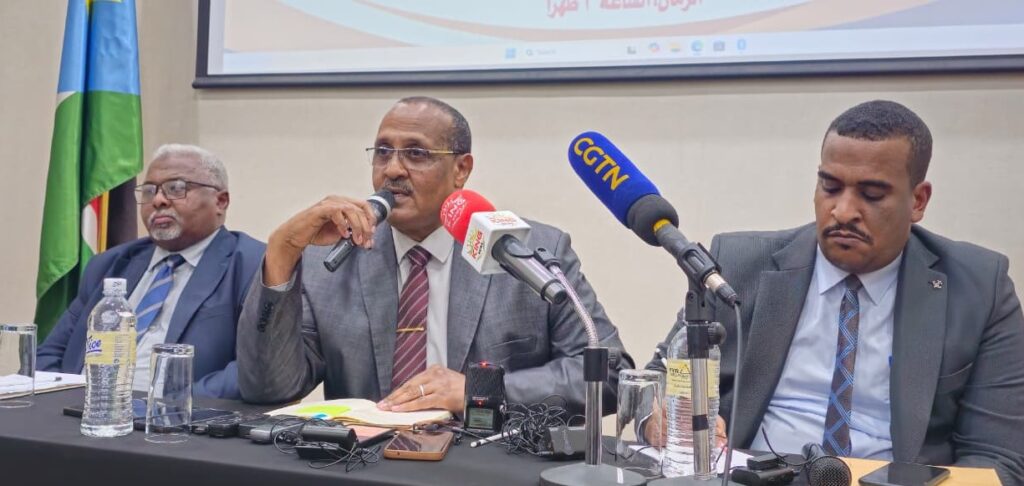Sudan’s ambassador to South Sudan warned Wednesday that escalating attacks by the paramilitary Rapid Support Forces (RSF) on oilfields are threatening critical infrastructure and could destabilize both Sudan and South Sudan.
Landlocked South Sudan relies on Sudan to export its oil through Port Sudan on the Red Sea, paying transit fees. Exports had only recently resumed after a nearly yearlong suspension due to pipeline damage caused by fighting.
Sudan’s military and the paramilitary Rapid Support Forces have been fighting for control of the country since April 2023.
Speaking at a press conference in Juba, Ambassador Essam El-Din Mohamed Hassan Karar said the RSF had recently targeted one of the oil-producing areas near the border with South Sudan, killing at least one civilian and raising concerns over potential disruptions to oil exports.
“Yesterday’s attack on the oil-rich area of Heglig killed a citizen,” Karar said. “Everyone knows this is the region where the oil rights movement and pipelines are concentrated.”
He emphasized that crude oil exports from South Sudan — which are transported through Sudan to international markets — are a vital economic lifeline for both countries.
“The economic aspects of Sudan are closely linked to the Republic of South Sudan, especially in terms of oil and gas flows to the export port,” Karar said. “Any disruption impacts both economies and threatens regional stability.”
The Sudanese diplomat ambassador accused the United Arab Emirates of financing and training mercenaries to fight alongside the paramilitary Rapid Support Forces.
He alleged that a UAE-based company in Dubai is working with a Colombian firm to recruit former Colombian soldiers. The fighters are reportedly trained in Dubai before being sent to Sudan to join the paramilitary Rapid Support Forces (RSF).
“They support the development of weapons and aircraft, and they support the rebels who are attacking vital infrastructure and destroying the country,” Karar said. “This cannot happen without weapons and financial support.”
Karar provided specific, though unverified independently, details about the alleged operation. He claimed that recruits are paid between $2,000 and $3,500 and receive $10,000 upon completion of their contracts. He also referenced a similar alleged scheme in 2020, in which Sudanese youth were reportedly recruited as security guards in the UAE before being sent to fight in Libya.
“This is not only a threat to security and stability in Sudan, but also to the entire African continent,” he said.
Karar sought to portray Sudan’s military-led government as gaining international legitimacy and achieving economic progress.
He cited plans for General Abdel Fattah al-Burhan, Sudan’s de facto leader, to attend the U.N. General Assembly in New York as “a great proof of recognition of the Sudanese government.” He also pointed to the resumption of oil flows from South Sudan through Sudanese pipelines, calling it a crucial economic development for both countries.
Domestically, he outlined measures to revive the economy, including a strategic agricultural plan and a new centralized budget for gold exports aimed at curbing smuggling and increasing public revenues.
Karar claimed the military has regained control over more than 85% of the country, leading to improved security and the voluntary return of internally displaced people and refugees.
“Now, the capital is witnessing a very big movement, and commercial and social activities lead to stability and the return of life to its natural state,” he said.
The claim could not be independently verified. Humanitarian groups say Sudan remains one of the world’s worst crises for displacement and hunger.
Karar said humanitarian aid is being delivered in areas controlled by the military-led government, but accused the RSF of intercepting aid bound for Darfur.
He said the U.N. Human Rights Council had condemned RSF actions, and that the U.N. Security Council had, for the first time, issued a statement calling for the group to lift its siege on the city of El Fasher.
Karar also welcomed international rejection of a statement issued by political groups backing the formation of a parallel government led by RSF commander Mohamed Hamdan Dagalo.
RSF commanders and UAE officials could not immediately be reached for comment.
The conflict in Sudan has killed more than 20,000 people and displaced some 15 million, according to the United Nations and Sudanese officials. A separate study by U.S. universities estimated the death toll could be as high as 130,000.




